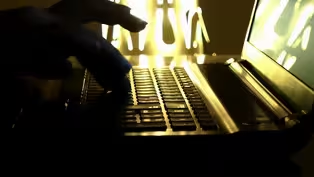
The Last Mile
Clip: Season 6 Episode 5 | 10m 20sVideo has Closed Captions
Rhode Island inmates are learning to code.
Inmates in Rhode Island are learning to code and make websites behind bars, aiming to achieve the ultimate goal once they get out: never to return to prison again.
Problems playing video? | Closed Captioning Feedback
Problems playing video? | Closed Captioning Feedback
Rhode Island PBS Weekly is a local public television program presented by Ocean State Media

The Last Mile
Clip: Season 6 Episode 5 | 10m 20sVideo has Closed Captions
Inmates in Rhode Island are learning to code and make websites behind bars, aiming to achieve the ultimate goal once they get out: never to return to prison again.
Problems playing video? | Closed Captioning Feedback
How to Watch Rhode Island PBS Weekly
Rhode Island PBS Weekly is available to stream on pbs.org and the free PBS App, available on iPhone, Apple TV, Android TV, Android smartphones, Amazon Fire TV, Amazon Fire Tablet, Roku, Samsung Smart TV, and Vizio.
Providing Support for PBS.org
Learn Moreabout PBS online sponsorship- So call funk and pass in the idle.
- [Steph] Every day inside this medium security prison in Cranston- - [Delacruz] It expects an array.
- [Steph] A dozen inmates are learning to code.
- I expect you to give me an array and I expect you to give me a function.
- [Steph] Dennis McDonald uses JavaScript to create a game, rock, paper, scissors.
- It was pretty complicated.
- [Steph] Across the classroom, Benjamin Delacruz is often seen helping other students as they work on computers figuring out how to program websites and games.
- These skills are enough for you to be a web developer where you're just making websites, right?
If you want to take it further, you can learn more programming and algorithms and be a software developer and make software.
You know, the sky's the limit.
- [Steph] The class, which meets five days a week, is unlike any other educational program offered in prison in Rhode Island.
For one, the students have laptops which they get to take outside the classroom.
- When folks started going back to their cells with laptops, there was a little bit of panic.
What they're doing is continuing the work they were doing in the classroom at the desktop.
And so when they go back to the classroom, it syncs back up to what they were doing.
- And there's no chance they can connect to the outside world?
- Absolutely not.
- [Steph] Wayne Salisbury is the director of the Rhode Island Department of Corrections.
He launched this program last spring after hearing about it from a state senator who got a call from an inmate who read about the program in a magazine.
It's called The Last Mile, a reference to the last leg of a person's incarceration and reentry into society and started in San Quentin Prison in California more than a decade ago.
Now it's offered in eight states, including Rhode Island.
- It afforded folks the opportunity to learn skills and provide training to them that is relevant in today's job market, and provides an opportunity for them to be gainfully employed upon release.
Recent statistics say that 75% of the folks that are involved in this program gain employment when they're released from prison, which is astounding.
- [Steph] The ultimate goal of the program is to end the cycle of repeat offenders.
In Rhode Island, more than 40% of inmates end up back in prison within three years.
- I was out for over 15 years before this incarceration happened.
- [Steph] Delacruz first ended up in prison for a short stint when he was 18.
For years after that, he says he struggled to land reliable work.
- It's the same cycle.
I would apply for jobs, they don't know my record yet.
You know, my resume was decent.
I would get the interview, they would love me in the interview, right?
I'd present well, I speak well, but then, you know, we have to do this background check.
That's it.
The door slams shut.
- [Steph] Eventually, he made a choice.
- I resorted to selling drugs, which is what I ended up doing.
- [Steph] He was sentenced to eight years in prison in 2021.
Initially, he started trying to teach himself how to code out of books so when the state launched The Last Mile program, he knew he wanted in.
- I was pretty quick to jump on it because I saw that as an opportunity to continue what I had started.
I kind of saw it as a sign.
- [Steph] Web developers are in high demand and can usually work remotely, potentially reducing one barrier to getting a job with a felony record.
- This is an industry that thankfully doesn't care too, too much about that.
This is, can you do the work?
You know what I mean?
Do you have these skills?
- [Steph] Do you see this as a way to prevent you or your fellow inmates from ending up back here?
- A thousand percent.
- [Steph] The class is taught remotely by instructors from The Last Mile, most of them are formerly incarcerated themselves.
When we visited back in December, it was the last class before Christmas, so the teachers surprised the students with a trivia game.
- [Instructor] History for 400.
- [Inmate] Who is Ford?
- All right.
- [Steph] Marylouise Joseph staffs the classroom as a program facilitator.
- We hope it's giving them the tools that they need to get out there and get a job, a realistic job that's going to help them support their families and allow them to stay out of prison and make something of themselves.
- [Steph] Joseph has worked in reentry for years, so she knows how hard it can be to stay on the outside once released.
- The biggest challenge is jobs, housing.
You know, those right there.
If somebody could walk out into a job and they've got a place to live, that is literally half the battle.
- Why is it so important that people get job training while they are incarcerated?
- You're setting people up for success when they get out.
And in many cases, folks may have had employment before they were incarcerated, but in some cases they don't.
They may not have the skill sets.
By not having employment, it makes the struggle even more real for them when they get out.
- And when you see people come back here, what's your first thought, we failed them?
- I think the system fails them.
And I was very naive when I assumed the acting role and I said let me fix the recidivism rate because I thought it was just the DOC.
And it's not just the DOC.
There is so much working against somebody when they get released.
So part of that is us breaking down those barriers in order to help them help themselves and not come back.
- [Steph] In Rhode Island, the recidivism rate has dropped from 51% of inmates released in 2017 returning within three years, to 44% for the inmates released in 2020.
It's too soon to know if the Last Mile Students in Rhode Island will have a lower rate, since the program just started last year.
But nationally, The Last Mile says the three year recidivism rate for its programs is only 5%.
- That has definitely given us opportunity to gain a career and hopefully that the program just keeps going forward and it could change more people's lives.
- [Steph] Dennis McDonald, who previously worked jobs in factories and for moving companies, hopes to get into web development when he gets out.
- I don't want to just let this time go to waste so while I'm here, I'm just trying to learn as much as I can and try to change my life around, basically.
- [Steph] You don't wanna end up back here?
- No.
- This is not happening again.
So I'm doing this hoping that it can put me that much further ahead so that I can have a meaningful career.
- [Steph] Delacruz is hoping to be an instructor for The Last Mile when he gets out, which could be as soon as this spring.
- Since being in this class and helping the other guys out, I've somehow stumbled upon I have a knack for teaching.
- [Steph] The 38 year old's motivation?
His two daughters, ages four and nine.
- I grew up without my dad.
So I always said that the one thing I would never do is leave my kids how he did.
And to see myself here, that's a broken promise 'cause I left them.
- [Steph] Right now, only a small number of Rhode Island's 2300 inmates have access to this program.
There's just this one classroom set up in the medium security facility, and only those who have three years or less left on their sentence can apply.
That means inmates in minimum or max can't participate, and neither can women.
- I want to be able to afford the opportunity for those that are interested as best we can, expanding that to potentially other facilities, whether it be the minimum facility or the women's facility, probably more than likely.
- I'd like it to be in every facility.
I'd like it to be offered to every individual that comes through our doors.
That's a tall order.
- [Steph] Expanding will cost money, much of which The Last Mile is willing to cover.
The nonprofit is funded by philanthropic dollars and grants, including from big tech companies.
If the program's able to expand and you had the opportunity to ask lawmakers up on Smith Hill, hey, here's why you should put money into this program and let us expand it, what would your argument be?
- I think the argument is just obvious.
You know, you lead a horse to water, right?
We all know the rest of that.
So that's my argument.
That would be my strong argument because it's obvious.
That's what we all want.
We all want peace of mind.
What gives us peace of mind?
Home and heart.
That's what gives us peace of mind.
And that's what these individuals are looking for.
And I hope people see that.
Video has Closed Captions
Clip: S6 Ep5 | 8m 57s | Why are cyberattacks on the rise? (8m 57s)
Video has Closed Captions
Clip: S6 Ep5 | 4m 58s | U.S. Senators Jack Reed and Sheldon Whitehouse question President Trump’s nominees. (4m 58s)
Providing Support for PBS.org
Learn Moreabout PBS online sponsorship
- News and Public Affairs

Top journalists deliver compelling original analysis of the hour's headlines.

- News and Public Affairs

FRONTLINE is investigative journalism that questions, explains and changes our world.












Support for PBS provided by:
Rhode Island PBS Weekly is a local public television program presented by Ocean State Media

